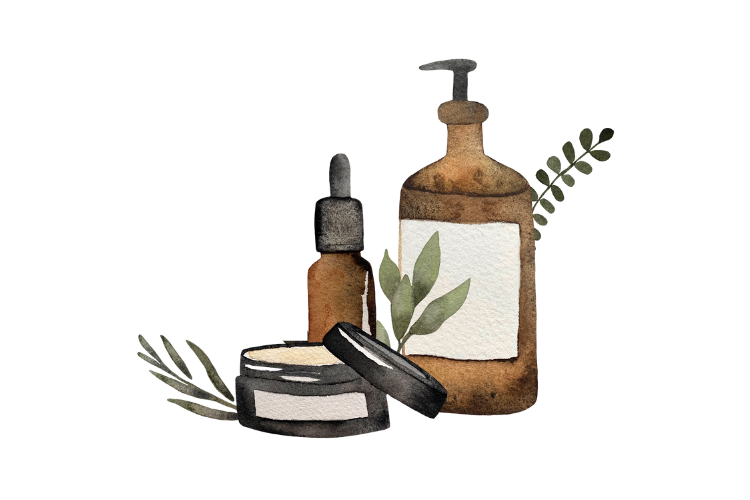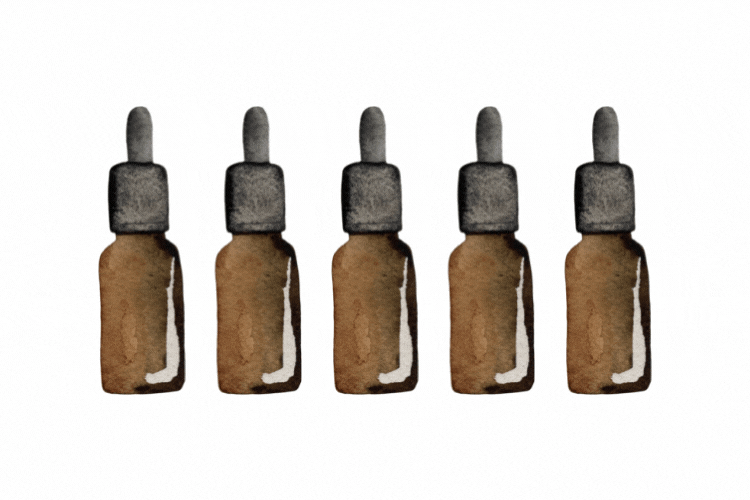Perfumery Terms
Perfumery Terms: A Glossary
Absolute
A highly concentrated fragrance oil, similar to essential oil, produced through an extraction process using volatile solvents. The solid material extracted is combined with alcohol to create the absolute.
Accord
A combination of several perfume notes or ingredients that produce a unique scent, different from the individual notes.
Animal
Originally referred to animal-derived ingredients like ambergris or musk with a sensual, musky smell. Modern animal facets are usually replaced by synthetics.
Base Notes
The heaviest and longest-lasting notes in a fragrance, acting as a foundation that enhances other ingredients and develops into a unique scent known as the "dry down."
Citrus
Composed of oils from lemon, orange, bergamot, grapefruit, or mandarin zest, citrus notes add fresh, clean, and bright top notes to a fragrance.
Concrete
A solid, waxy substance obtained from plants using volatile solvents, further rinsed with alcohol to produce an absolute.
Core Notes
Also known as middle or heart notes, core notes define a scent's character and influence the base notes, often featuring smooth floral or fruit tones.
Chypre
A fragrance family with a mossy, woody base, inspired by the smells of Cyprus, featuring sharp patchouli, oakmoss, and citrus notes.
Distillation
An extraction method for obtaining aromatic compounds from plants using steam evaporation.
Eau de Cologne
Fragrances with a concentration of 2% to 5% fragrance oil to alcohol.
Eau de Toilette
Fragrances with a concentration of 5% to 10% fragrance oil to alcohol.
Eau de Parfum
Fragrances with a concentration of 10% to 20% fragrance oil to alcohol.
Essential Oils
Concentrated distillations of fragrant plants, usually extracted via steam distillation.
Extract
A concentrated extraction from a natural source, representing the source aroma, or synthesized in a lab for consistency and sustainability.
Fougère
Named after the French term for fern, featuring green, aromatic herbal scents with lavender, oakmoss, citrus, and woods, often used in men's scents.
Headspace
A method of capturing scent molecules from an object to create a synthetic version, pioneered in the 1970s.
Hesperidic
A term describing essential oils obtained from citrus fruits.
Molecular Distillation
A technique to remove colors or contaminants from essential oils and extracts, resulting in very pure raw materials.
Maceration
A method of removing essential oils from flowers by soaking them in warm fats, then dissolving in alcohol for several weeks at a reduced temperature.
Maturation
The aging process required for a perfume concentrate to reach its full potential before being incorporated into a base.
Natural
Perfume ingredients derived from natural, non-synthetic sources.
Olfactory
Relating to the sense of smell.
Olfactive Families
A classification system categorizing perfumes by their dominant notes, such as aromatic, chypre, citrus, floral, fougère, leather, oriental, and woody.
Parfum
The most concentrated form of perfume, containing 20% to 45% fragrance oil to alcohol. The term is interchangeable with Perfume.
Resinoid
A viscous substance extracted from plant resin using volatile solvents, used to make absolute.
Sillage
A French term describing the trail of scent left in the air when someone leaves a room.
Synthetic
Perfume ingredients created through chemical synthesis, often used as substitutes for expensive or unsustainable natural ingredients.
Top Notes
The lightest and first notes you smell in a perfume composition.
Absolute
A highly concentrated fragrance oil, similar to essential oil, produced through an extraction process using volatile solvents. The solid material extracted is combined with alcohol to create the absolute.
Accord
A combination of several perfume notes or ingredients that produce a unique scent, different from the individual notes.
Animal
Originally referred to animal-derived ingredients like ambergris or musk with a sensual, musky smell. Modern animal facets are usually replaced by synthetics.
Base Notes
The heaviest and longest-lasting notes in a fragrance, acting as a foundation that enhances other ingredients and develops into a unique scent known as the "dry down."
Citrus
Composed of oils from lemon, orange, bergamot, grapefruit, or mandarin zest, citrus notes add fresh, clean, and bright top notes to a fragrance.
Concrete
A solid, waxy substance obtained from plants using volatile solvents, further rinsed with alcohol to produce an absolute.
Core Notes
Also known as middle or heart notes, core notes define a scent's character and influence the base notes, often featuring smooth floral or fruit tones.
Chypre
A fragrance family with a mossy, woody base, inspired by the smells of Cyprus, featuring sharp patchouli, oakmoss, and citrus notes.
Distillation
An extraction method for obtaining aromatic compounds from plants using steam evaporation.
Eau de Cologne
Fragrances with a concentration of 2% to 5% fragrance oil to alcohol.
Eau de Toilette
Fragrances with a concentration of 5% to 10% fragrance oil to alcohol.
Eau de Parfum
Fragrances with a concentration of 10% to 20% fragrance oil to alcohol.
Essential Oils
Concentrated distillations of fragrant plants, usually extracted via steam distillation.
Extract
A concentrated extraction from a natural source, representing the source aroma, or synthesized in a lab for consistency and sustainability.
Fougère
Named after the French term for fern, featuring green, aromatic herbal scents with lavender, oakmoss, citrus, and woods, often used in men's scents.
Headspace
A method of capturing scent molecules from an object to create a synthetic version, pioneered in the 1970s.
Hesperidic
A term describing essential oils obtained from citrus fruits.
Molecular Distillation
A technique to remove colors or contaminants from essential oils and extracts, resulting in very pure raw materials.
Maceration
A method of removing essential oils from flowers by soaking them in warm fats, then dissolving in alcohol for several weeks at a reduced temperature.
Maturation
The aging process required for a perfume concentrate to reach its full potential before being incorporated into a base.
Natural
Perfume ingredients derived from natural, non-synthetic sources.
Olfactory
Relating to the sense of smell.
Olfactive Families
A classification system categorizing perfumes by their dominant notes, such as aromatic, chypre, citrus, floral, fougère, leather, oriental, and woody.
Parfum
The most concentrated form of perfume, containing 20% to 45% fragrance oil to alcohol. The term is interchangeable with Perfume.
Resinoid
A viscous substance extracted from plant resin using volatile solvents, used to make absolute.
Sillage
A French term describing the trail of scent left in the air when someone leaves a room.
Synthetic
Perfume ingredients created through chemical synthesis, often used as substitutes for expensive or unsustainable natural ingredients.
Top Notes
The lightest and first notes you smell in a perfume composition.






























Leave a comment